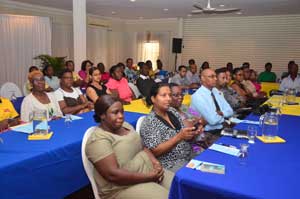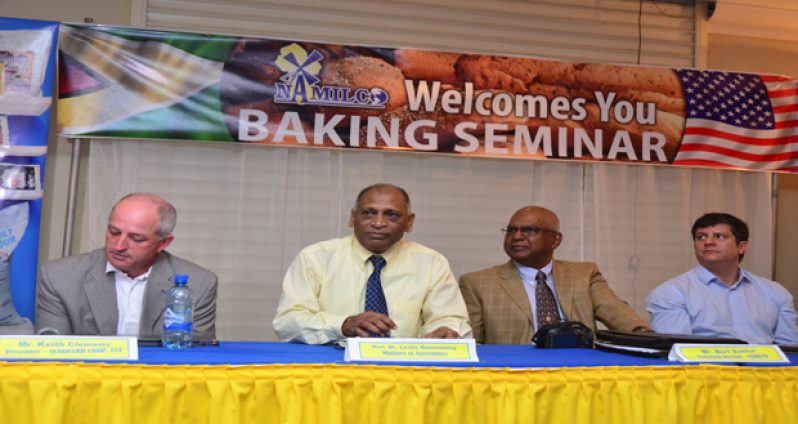THE National Milling Company of Guyana Inc. (NAMILCO), in collaboration with Seaboard Corporation USA and Engrain USA, on Wednesday hosted a Baking Seminar at the Parc Rayne at Rahaman’s Park, East Bank Demerara.
 The seminar had as its theme “Taking Guyana’s Bakeries to the next level”, and it brought together scores of bakers, pastry and cake professionals and related others with representatives of the stakeholder entities for an inspiring day of sharing and sensitization on the social and economic realities of weathering the storm in Namilco’s stated quest.
The seminar had as its theme “Taking Guyana’s Bakeries to the next level”, and it brought together scores of bakers, pastry and cake professionals and related others with representatives of the stakeholder entities for an inspiring day of sharing and sensitization on the social and economic realities of weathering the storm in Namilco’s stated quest.
The main objective of the seminar was to give local bakers opportunity to do the following:
Learn new techniques to further enhance their baking skills
Learn about the latest developments in the global bread industry, and
Learn about creating niche products to bring variety to the consumers.
The meeting also focused on good manufacturing practices.
Guest Speaker was Agriculture Minister Dr. Leslie Ramsammy, while NAMILCO’s Managing Director, Mr. Roopnarine (Bert) Sukhai, delivered the Opening Remarks. Chairperson was Marketing Consultant Mr. Affeeze Khan.
Special guest presenters were Mr. Miguel Galdos, a provider of services throughout the continent of South America, who is based in Chile; and Mr. Keith Clemens, a graduate of the ‘American Institute of Baking’ attached to Seaboard Corporation, Namilco’s head office, and having more than 25 years’ experience in the baking industry, covering Africa, North America and the Caribbean.
Namilco is a subsidiary of Seaboard Corporation, which is based in Shawnee Mission, Kansas, USA and the collaboration was in keeping with Namilco’s commitment and its ISO 2008 mandate to maintain its reputation for excellence in the services that it provides to its customers.
Minister Ramsammy, who underscored the fact that bakeries are as important as anything else in ensuring the nation eats right, thanked Seaboard for its collaboration in making the event possible, and noted that it is indeed an important step forward for the local baking industry.
He said it is important that the food industry be taken to another level, so Guyana can compete in the global train. He urged all assembled to make their focus and priority the maintenance of standards.
Dr. Ramsammy noted that Guyana is faced with many challenges in the flour manufacturing business, including high electricity rates as a major challenge. He said that compared to countries globally and a few regionally, he considered Guyana’s electricity rates ‘way too high’. To this end, he said Guyana has no option but to pursue alternative fuel sources, and he strongly recommended hydro-power generation.
“We must create a new dispensation in this country. A new energy paradigm must now be pursued, and that is hydro electricity,” Dr Ramsammy declared.
Other challenges which he said Guyana must frontally address include the Environmental tax issue; astronomical food import bills, and the dumping of commodities on countries such as Guyana. Noting that Guyana does not stand alone as regards high food import bills, Minister Ramsammy alluded to CARICOM’s US $5.2 billion food import bill, 83% of which is spent on commodities coming from outside of CARICOM countries, while a mere 17% is spent on imports from fellow CARICOM countries.
Not least, he said, is the need to halt importation of bread products such as bagel and croissant, which can be made locally. He said that with innovation and commitment, Guyana can produce the finest quality bakery products on its own initiative to satisfy the local market, as well as focus on producing specialty items for tourists and other non-Guyanese on demand.
And commending Namilco for its innovation at producing pholouri mix, Minister Ramsammy also challenged Namilco to turn its attention to manufacturing blended flour, citing breadfruit and rice flour as having the ability to combine well with wheaten flour.
“Namilco has already demonstrated, through its pholouuri mix, that we can blend other things (to come up with novel inventions)” he said. This approach, the minister feels, can effectively reduce Guyana’s US$25M wheat importation bill.
“The more we spend importing, the less we have to create jobs for our people,” Ramsammy declared.
He called on the stakeholders to commit themselves to producing and promoting a unique Guyanese culinary art that is second to none.
Chairperson Mr. Afeeze Khan, in a brief overview of the National Milling Company, said the company threw its doors open in 1969, first wholesaling flour in 45-kilogramme bags. He recalled the scenario of wholesalers and retailers having to queue up in long lines overnight, and even sleeping on the trucks, to be assured of acquiring supplies early the following morning. But with time, he said, the company put systems in place to ensure distribution was done in the regions, having regard to consumers’ safety and comfort.
He said also that an engineer and lab technician were on spot at all times during the distribution process to ensure the purchasers got value for money, and did not lose financially.
Afeeze disclosed that, over the last 20 years, there have been drastic changes in policy at Namilco, and this has seen dramatic improvement in hygienic practices. The company is now focusing on machine packaging of flour, and is calling on all regions to ensure they sell only Namilco’s machine packaged flour.
All these initiatives, Afeeze said, were the brainchild of the man now at the helm, the visionary Managing Director Mr. Roopnarine Sukhai, who is also President of the Caribbean Millers’ Association.
Of the training seminar, Mr. Sukhai said, “Namilco sees it as giving back to bakers in a loyal way.” He touched on the increased cost of shipping and discharging of wheat. And about the Guyana Power and Light’s conversion from 50 cycles to 60 cycles, resulting in considerable down time, he said the net result was that the flour mill has been forced to operate on its own grid.
He hinted also at the non-passage of the Anti-Money Laundering (AML/CFT) Bill, the result of which is that acquisition of the US dollar will now cost more local dollars. Sukhai expressed hope that acquisition of the US dollar would not become a hassle.
And commenting on the rising cost of producing flour, Sukhai admitted that the local costs for wheat and raw materials have risen steeply, prompting him to add that Namilco now needs a new mill to keep a competitive edge. But despite the rising cost of producing flour, he assured, “Namilco will continue to do whatever it can to keep the cost of flour stable.”
“We are always available to offer advice,” Sukhai assured bakers.
Some of the areas covered during yesterday’s seminar were:
* A review of the baking process, with emphasis on the relation of good manufacturing practices, sanitization, and the final baking results
* Functionality of baking ingredients and the relation with baking performance and the final product
* Mixing and Fermentation: dough development, relationship between mixing and fermentation, as well as different mixing techniques
* Preferment: types and advantages for the baker
* Sweet Goods: types, ingredients, make-up procedures
* Bakery item trends. What’s hot around the world.
Written By Shirley Thomas





.jpg)








